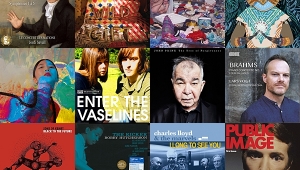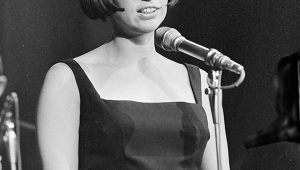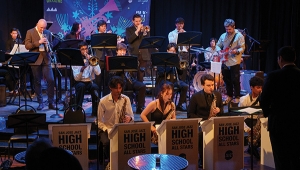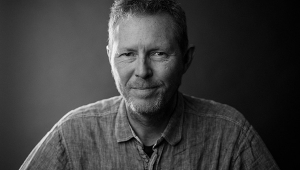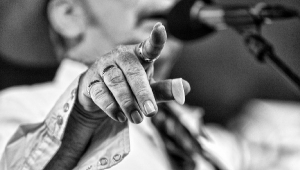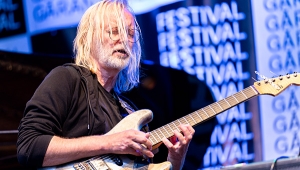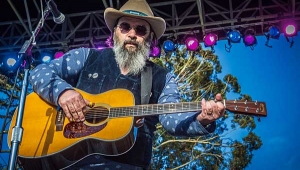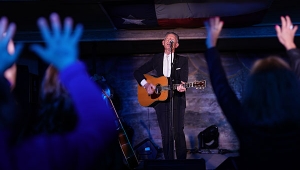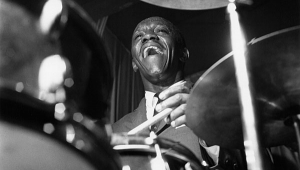| Columns Retired Columns & Blogs |
Willie Nile: the Bard on Bleecker Page 2
"I met John the following week. I got into the wrong elevator bank and I was late for the gig. We recorded a session, maybe eight songs, something like that. He said to me, 'You've got something, but I think you need a little more experience, a little more seasoning. You're not quite ready for Columbia, but you have something.' I listen to those recordings now, and he was right. He also said, 'I just signed this kid out of New Jersey," which was Bruce. I told Bruce that story and he laughed."
The streets of New York
Unfold like a matchmaker's dream.
Day becomes night,
Through canyons of concrete and steam.
—"Streets of New York," from Streets of New York
In July 1978, Robert Palmer of the New York Times reviewed a performance at Kenny's Castaways, a now sadly defunct Greenwich Village club, for which Nile was the opening act. Record-business people took notice, and suddenly the club began to fill for Nile's weekly gig. Palmer described Nile as "an artist who is at once an iconoclast and a near-perfect expression of contemporary currents," and went on to provide what may still be the best description of his music: "Mr. Nile's musical personality is complex. On one hand, he writes rock-and-roll songs that combine the innocence and lyricism of Buddy Holly with the rogue intensity of Gene Vincent . . . but he will turn around and do ballads that are heavily freighted with personal imagery and philosophical undercurrents, ballads that are occasionally reminiscent of the early Bob Dylan but tend to be more musically and lyrically coherent."
Nile smiles, still a little embarrassed by the muscular praise. "At that time, Doc Pomus would come to see me play. It was a real thrill for me. I finally asked him one night, 'Hey Doc, how come you keep coming all the time?' and he said, 'I like what you're doin', kid.'"
After Clive Davis visited Kenny's, Nile signed with Davis's label, Arista, and released his self-titled debut in 1980. The follow-up, Golden Down, was released the following year. Both records are soon to be reissued by Nile on CD and LP. Unfortunately, a measure of success often comes with complications, and Nile's early fame was no exception.
"I was treated very well by Arista. I have no problems with Arista or Clive—Clive was great to me. No one interfered with me in the least. I made those records on my own. But then I had problems with an attorney and a former manager who were making my life hell. I went through a bankruptcy. All this trouble led to my getting out of the Arista deal."
Disillusioned with the music business, Nile retreated to Buffalo, where for nearly a decade he raised four kids (Luke, Jo, Mary and Bob) and did not perform in public, yet he never stopped working on songs. "I've always written, whether I was in the record business, whatever that is, or not. If I was a plumber, living in Alaska, I'd come home from work or on the weekend and I'd write a song. That's what I do.
"I walked away because I got into it with the best of intentions. I wanted to have fun. I wanted to make music and learn. I didn't get into this to be in court every minute. People smelled money, and I was into music. Of course, I'd love to be stinking rich. Make no mistake: I'd be a great rich guy. Still fully intend to. That is just taking a little longer than I thought, but . . ."
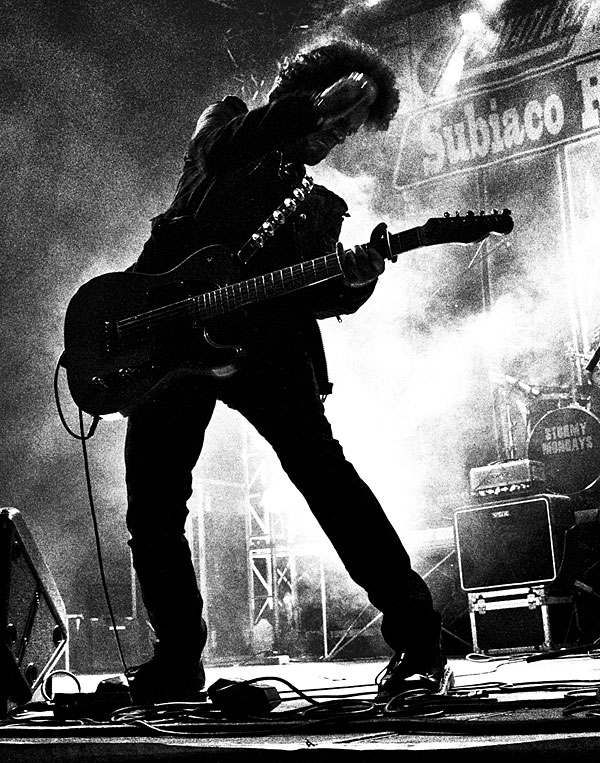
A videotape of Nile playing a concert in Norway provided the entrée to the second act of his career when it found its way into the hands of Rick Chertoff, who'd been at Arista during Nile's time there but was now a rising star at Columbia. He signed Nile in 1988, but nearly two years then passed before Chertoff could find time to produce Nile's Places I Have Never Been, released in 1991.
"By then, Rick was on the way out, and there were new people coming in, and I didn't have a champion in place. So the record was left on its own. I heard from people before it came out that it wasn't going to have much of a chance. The thing is, I knew that there was a lot of right-time/right-place in the record business, and it was one of those times when it was the just wrong time, wrong place. Had it come two years earlier . . ."
After Places, Nile again walked away from the business—and, again, never stopped writing songs. After the self-released Beautiful Wreck of the World received much praise in 2000, Nile began to make Streets of New York, an album filled with so many near-classic songs—"Welcome to My Head," "Streets of New York," "The Day I Saw Bo Diddley in Washington Square"—that it's still his finest, most lasting recording. Since its release in 2006 he's been on a tear, building his fanatical East Coast fan base, touring Europe with ever greater regularity, and collecting high-profile fans like Bono, Lou Reed, and, especially, Bruce Springsteen, with whom Nile has shared the stage in both Giants and Shea stadiums.
As Nile has aged, his songs have become more philosophical, more anthemic, more political. On Streets of New York, "Cell Phones Ringing (in the Pockets of the Dead)" described the 2004 Madrid train bombing. On House of a Thousand Guitars, the rousing, expansive number is the title tune. On The Innocent Ones it's "One Guitar," which became a marching anthem for the Occupy Wall Street movement. On American Ride he's upped the ante with "Holy War," an over-the-top song about victims of terrorists that Nile admits he found a challenge to sequence. "I guess it's an angry song for peace, it's a cry for peace."
Having quit his day job as a magazine copy editor two years ago, Nile is ecstatic that he's back doing music full time. He's also pleased that his new quartet—guitarist Matt Hogan, bassist Johnny Pisano, and drummer Alex Alexander—may be the tightest band he's ever had. Despite Nile's recent success, he's aware that there are those who think that, at his age, to continue touring and engaging with the music business must mean that he's permanently naïve, or an incredible glutton for punishment.
"Recently, in the process of saying nice things about my records, a writer I know said that maybe because my road has been harder, I've kept my edge. Music still inspires the hell out of me. If it didn't, I wouldn't waste my time or anybody else's. I would never walk on a stage or in the studio and expect anybody to listen to anything I'm doing if I didn't think maybe there was something special.
"I'm too ignorant to have a chip on my shoulder. I'm just an idiot when it comes to that. I'm not bitter. I never was. I've always been upbeat.
"I still feel it," he says, sweeping an arm across the Bleecker streetscape. "These streets where we are right now, I saw people begrudging each other's success—it doesn't need to be that way. It's about the beauty of song, the joy of making music. It's not about cameras. I say, follow your heart, follow your instincts. If you believe it, there's a better chance someone else might, too."
Ride to my window babe, come after midnight
no one on my street is awake or alive
we can pass time here kiss in the moonlight
what a fine thing to make love and survive
—"Vagabond Moon," from Willie Nile
- Log in or register to post comments
